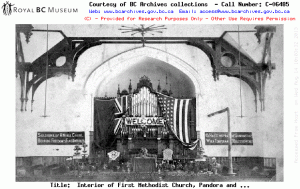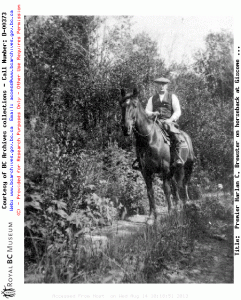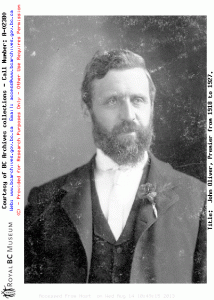*Le contenu de cette page n’est pas encore disponible en français. Veuillez accepter nos excuses. Nous espérons vous offrir plus de matériel en français dès que possible.
Learn more about politics in wartime Victoria in the digital archive
By 1915, an earnest and vocal minority of middle-class British Columbians had become interested in social reform, and were disenchanted with the Conservative Party which had governed the province for the last twelve years. These reformers advocated for temperance (limitations on the sale of alcohol) and female suffrage, both opposed by the Conservatives.[1] WWI was the catalyst to a sudden change in the balance of power between the Liberals and the Conservatives.

Interior of the First Methodist Church, Pandora and Broad, Victoria; decorated for the visit of Frances E. Willard, leader of the Women’s Christian Temperance Union.
Source: Image Courtesy of Royal BC Museum, BC Archives – Call Number: C-06485.
See BC ArchivesDate: 1883
The temperance movement in British Columbia dated back to the 1820s. The urbanization and industrialization occurring in the late nineteenth and early twentieth centuries had made the problems emanating from alcohol consumption highly visible, particularly among the poor. A branch of The Women’s Christian Temperance Union (WCTU), an American organization, had been established in B.C. in 1882. The women involved embraced contemporary ideas of the innate purity of womankind, and claimed they had a right to purify society by ridding it of alcohol. Not surprisingly, those women who felt their sex had a vital role to play in society’s spiritual rebirth also supported female suffrage through such organizations as the Political Equality League, formed in 1910.[2]
The Prohibition movement had many opponents, particularly transient male workers in the logging and mining sectors of the economy. Drinking was one of the few pleasures of their rough and often lonely existences in a province where men far outnumbered women.[3] Even in urban centers, drinking was popular and Victoria had over 100 licensed premises in 1900.[4]
The Local Option League made the first attempt to bring Prohibition to B.C. The League sought legislation that would allow municipal voters to decide whether to ban sales of alcohol in their town. Premier Richard McBride was opposed to Local Option, because appointing members of the board that dispensed liquor licenses was a lucrative source of patronage. Although McBride promised a referendum on the permissibility of local option laws in the 1909 election, it did not win the majority of those who voted in the general election, one of his conditions. Later, it was revealed that McBride’s government had not printed enough ballots for the referendum, thus making a positive result impossible, or highly unlikely.[5] Undeterred, but quickly losing faith in the Conservative Party, many who had supported Local Option moved on to support the People’s Prohibition Association. This group desired not simply a municipal choice in terms of alcohol sales, but the end of all alcohol sales in the province.[6]

Premier Harlan C. Brewster on horseback at Giscome Portage.
Source: Image Courtesy of Royal BC Museum, BC Archives – Call Number: D-00373
See BC ArchivesDate: September 1917
The war gave new credence to the calls for change. Prohibition gained widespread support as a way to conserve grain to feed the allied troops. The new Premier, Conservative William Bowser, promised binding referendums on women’s suffrage and prohibition in the 1916 election. Reformers could not forget that Bowser had opposed both these causes for years, however, and the aura of corruption surrounding his actions as the Attorney-General in Richard McBride’s government continued to haunt him. Liberal leader Harlan C. Brewster, who was in favour of both prohibition and ending patronage in government, won the election. [7] The electorate voted 51 892 for and 24 606 against women’s suffrage, rewarding women for the work they had done on the home front during the war.[8] Prohibition was defeated, however, because of the votes of B.C. soldiers overseas. Brewster commissioned an inquiry, which revealed massive electoral fraud, particularly by officers in the army, and cast suspicion on McBride who, as the new Agent-General in London, had overseen the voting process.[9] Over half of the soldiers’ votes were disallowed, and Prohibition came into effect. In 1918, the federal government passed a wartime measure banning the manufacture, transportation or sale of alcohol stronger than 1.5% alcohol per volume.[10] Canada had gone dry.
Despite the fervour of its advocates, Prohibition was widely deemed a failure. After the wartime imperative to save grain for soldiers had passed, along with federal restrictions on intra-provincial liquor trading and sales, people were no longer interested in complying, and the police were uninterested in enforcing it. The hypocrisy enveloping the system became apparent in December 1918, when W.C. Findlay, the Prohibition Commissioner, was arrested and pleaded guilty to smuggling 700 cases of whiskey into the province to sell for personal gain. [11] Harlan C. Brewster, one of the main champions of prohibition, only nine months after his resounding victory in the 1916 election. Many Liberals were dissatisfied with the effects of prohibition. Their new premier, John Oliver, needed revenue to pay off the provincial debt of 21 million, and railway bond guarantees of 64 million left by the Conservatives. In 1920, a binding referendum was held, offering voters either continued prohibition or government-controlled liquor sales; they chose the latter.[12]
The Liberals had come to power riding a crest of reform sentiment. Once in office, however, they behaved similarly to the Conservatives, even continuing the legacy of patronage.[13] Yet the Conservatives did not recover from the embarrassment of their scandals, and were torn apart by their own internal factions.[14] Apart from the premiership of Simon Fraser Tolmie during the Great Depression, there has never been a Conservative premier since Bowser’s defeat.

John Oliver, Premier from 1918 t0 1927.
Source: Image Courtesy of Royal BC Museum, BC Archives – Call Number: A-02380
See BC ArchivesDate: Undetermined
The Liberals, benefiting from an improved provincial economy after 1923, were able to fend off challenges by new political contenders, such as The Farmer’s Party of 1920, and the Provincial Party of 1922-24. These new groups claimed to represent agricultural interests and expressed dissatisfaction with the corruption of Liberals and Conservatives alike. The Provincial Party, however, won little lasting support because it was dominated by millionaires, while Oliver, a farmer from Delta, declared he was in touch with the needs of the people. Many British Columbians, especially those out of the capital region, were still in the preliminary stages of community development and lacked reliable infrastructure. [15] Oliver won because he promised British Columbians that despite the province’s troubled political past, the future was bright.
By Hannah Anderson
[1] Robert A. Campbell, Demon Rum or Easy Money: Government Control of Liquor in British Columbia from Prohibition to Privatization (Ottawa: Carleton University Press, 1991)
[2] Ibid., 20.
[3] Ibid., 16.
[4] Ibid., 18.
[5] The official results from this referendum were never released, making numbers difficult to tabulate. Ibid., 18-20.
[6] Ibid., 21.
[7] Victor Kastytis Dailyde, “The Administration of W.J. Bowser, Premier of British Columbia, 1915-1916,” (MA Thesis, University of Victoria, 1976)
[8] Ibid., 144.
[9] Hamilton, Sobering Dilemma, 62-65, 83, 111-120; Elections British Columbia and the Legislative Library, “An Electoral History of British Columbia, 1871-1986,” (1988), http://www.llbc.leg.bc.ca/public/pubdocs/bcdocs/37907/
[10] Robert A. Campbell, Demon Rum, 22.
[11] Findlay, a cherished member of the PPA, was responsible for managing alcohol legally brought into the province, such as for doctor’s prescriptions. Hamilton, Sobering Dilemma, 143, 151.
[12] Robert A. Campbell, Demon Rum, 25-27.
[13] McDonald, “Sir Charles Hibbert Tupper,” 77.
[14] Jean Barman, The West Beyond the West, 237.
[15] Dobie, “Party History in British Columbia,” 74; McDonald, “Sir Charles Hibbert Tupper,” 79-85.
Bibliography:
Barman, Jean. The West Beyond the West: A History of British Columbia (Revised Edition). Toronto: University of Toronto Press, 1996.
Campbell, Robert A. Demon Rum or Easy Money: Government Control of Liquor in British Columbia from Prohibition to Privatization. Ottawa: Carleton University Press, 1991.
Dobie, Edith. “Party History in British Columbia, 1903-1933.” In Historical Essays on British Columbia, edited by J. Friesen and H.K. Ralston, 70-81. Toronto: McClelland and Stewart, 1976.
Elections British Columbia and the Legislative Library. “An Electoral History of British Columbia, 1971-1986.“ http://www.llbc.leg.bc.ca/public/pubdocs/bcdocs/37907/
Hamilton, Douglas L. Sobering Dilemma: A History of Prohibition in British Columbia. Vancouver, B.C.: Ronsdale Press, 2004.
Kastytis, Victor Dailyde, “The Administration of W. J. Bowser, premier of British Columbia 1915-1916.“ MA Thesis, University of Victoria, 1976.
McDonald, Robert A.J. “Sir Charles Hibbert Tupper and the Political Culture of British Columbia, 1903-1924.“ BC Studies 149 (Spring 2006): 63-86.
Further Reading:
Howard, Irene. The Struggle for Social Justice in British Columbia: Helena Gutteridge, the Unknown Reformer. Vancouver: University of British Columbia Press, 1992.